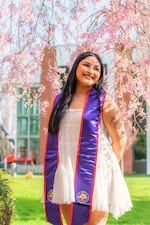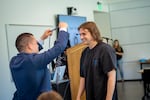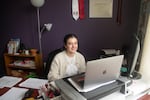For a long time, college was not part of Karina Alcantara Guerrero’s plan. But, as she approaches her graduation from Linfield University on Sunday, she’s realizing how far she’s come.
“I was just thinking about being in eighth grade and not thinking that I was going to college,” she said. “I got my grad pictures… and everything just felt a little bit more real.”
Alcantara Guerrero is from Oaxaca, Mexico, and she moved to Portland with her mom and siblings when she was 7. She said it wasn’t until her second year of high school, when she started working with Latino mentors, that she began thinking about college as an option.
She’ll be the first person in her family to graduate from college, and she said without a program for first-generation students at Linfield, it would have been much harder to get to this point.
“I did struggle a lot with imposter syndrome … there were definitely a lot of moments where I felt like I was out of place,” Alcantara Guerrero said. “Knowing that I had the program made me feel a lot better, and everyone reassured me that there was space here for me.”
Linfield’s First Scholars program started in 2019, making Alcantara Guerrero’s cohort the first graduating class.
First Scholars responds to changing student population at Linfield
Linfield leaders say they didn’t start the First Scholars program to solve a problem or address a deficit, but rather as a way to adapt to changing demographics on campus, and to be more inclusive in serving underrepresented students. Still, just a year into the new program, it was put to the ultimate test — a global pandemic that affected all students, but in particular first-generation students. Both Linfield students and staff say that while the creators of First Scholars couldn’t anticipate a disruption like COVID-19, the program helped build resilience.
First Scholars focuses primarily on students’ first year at Linfield, with a year of mentoring from older students and Linfield faculty and staff, as well as meetings and activities to help incoming students get oriented on campus. For the duration of their college career, the program offers a scholarship worth up to $8,000 per year, depending on financial need. Incoming first-generation students are automatically eligible for the program when they enroll at Linfield.
Alcantara Guerrero, like other First Scholars students OPB spoke with, said Linfield’s financial aid package was one of the biggest reasons for enrolling at the university.

Linfield senior Karina Alcantara Guerrero poses for a graduation photo. Alcantara Guerrero is currently a peer mentor and student coordinator for the First Scholars program.
Meghan Mullaly
The First Scholars program wasn’t established to address a problem with retaining or supporting students at Linfield. It was created to replace another program that university leaders found problematic.
University President Miles Davis, who is a first-generation college student himself, said First Scholars replaced a “diversity scholarship” the university had been offering.
“The only qualification for the diversity scholarship was for you not to be white,” said Davis, who is Black. “What we began to look at was, what is one of the reasons that people go to universities? And part of that is economic mobility — the chance to develop skills, the chance to find meaningful employment and also to help live a life of purpose — and quite frankly, that applies to all people, even white people.”
Davis said the new program was developed to support underrepresented students more holistically.
The two largest demographic groups in the program are Latino students and white students, making up 38% and 37%, respectively.
This past fall, roughly 200 students entered the program.
Davis said another big piece of the program is demystifying college for first-generation students. In addition to mentorship and events, Linfield created glossaries for First Scholars students filled with terms they may be unfamiliar with.
“Academia has a hidden language. It has hidden codes and you may not have been exposed to that,” Davis said. “And unlike my children who call me and ask me, ‘What do I do about this and that?’ [First generation students] often don’t have anyone that they can call and ask about that. And so it allows them to gather in a sense of belonging that would not be there if we were not doing this program.”
Creating support aimed at resilience, before anyone had heard of COVID
Since First Scholars began before the pandemic, it helped give first-generation students a chance to build a network on campus before they were cut off from it — even though program leaders had no way of anticipating that would happen.
Devin Thacker, a First Scholars student graduating this weekend, said he was definitely looking for a sense of belonging and community when he came to Linfield in 2019. Thacker is from Canby, about 30 miles east of Linfield’s McMinnville campus. He graduated from high school in 2018 and took a gap year working with the Future Farmers of America before starting at Linfield.
He said he wasn’t entirely sure how college was going to go, especially since he didn’t come in as a “traditional freshman” straight out of high school.
“My expectations weren’t super high. I was trying not to relate it to movies or anything like that, because it’s super unrealistic, but I was mainly just looking for a community on campus,” Thacker said.
He said First Scholars helped give him that community.
“I think that it was another thing when you came on campus that was a part of you,” Thacker said. “So if somebody heard that you were a first-gen student, they’re like, ‘Oh my gosh, me too.’”
Without the program, Thacker said he thinks his first-generation identity would have been “brushed under the rug,” or just something he didn’t really talk about. Instead, Thacker said the First Scholars program “highlights” students like him.

Gerardo Ochoa (left) gives Devin Thacker (right) his cords at an induction ceremony on May 18, 2023, for the Tri-Alpha Society, a national honor society for first-generation college students.
Timothy D. Sofranko / Linfield University
Linfield received a “Beacon Award” in 2021 for the First Scholars program from the Northwest Commission on Colleges and Universities, the region’s main accrediting body for postsecondary institutions. That award recognizes accomplishments related to student success, and the hope they can be recreated at other schools.
“We want our institutions to be able to replicate the wonderful work that Linfield has done,” NWCCU President Sonny Ramaswamy told OPB when Linfield received the award.
Linfield officials said the program has had positive effects on first-generation students including decreasing “summer melt” — when high school students are accepted to college, say they plan to enroll but then don’t follow through. The 2019 First Scholars cohort only saw one student “melt” and not start at the university. The 2020 cohort — the first group of high school graduates affected by COVID-19 — saw a summer melt of 10 students, or about 6% of that group, according to Linfield.
According to the university, before the First Scholars program began, 54% of first-generation students were graduating from Linfield within five years. That’s compared to a 61% graduation rate for all students.
Across all Oregon institutions, the percentage of first-generation students completing degrees has increased over the years. According to data from the Oregon Higher Education Coordinating Commission, 49% of first-generation students completed a degree or transferred to a four-year institution from a community college in the 2016-17 school year. That rose to 52% of first-generation students in the 2020-21 school year.
With the first cohort of Linfield First Scholars graduating this Sunday, the university says it’s too early to know how the program has affected the grad rate. The program’s 81% retention rate indicates First Scholars students are slightly more likely to persist from year-to-year than the average Linfield student, and they stay enrolled at a higher rate than the national average, according to data from 2021.
There’s not a lot of data available regarding how first-generation students fared over the course of the pandemic. Though a survey out of the University of California-Berkeley and University of Minnesota in the summer of 2020 showed that first-generation students were more likely than continuing-generation students to deal with wage loss, mental illness and other hardships during the pandemic.
“I don’t know how much I rely on the data other than the anecdotes that I have from students,” said Gerardo Ochoa, Linfield’s vice president for enrollment management and student success, who created the First Scholars program along with President Davis. “‘Did [the program] impact you? Did it make you feel like you belong? Do you feel seen?’”
Building connections and sustaining them during the pandemic
It hasn’t been all smooth sailing over the past four years for the First Scholars program.
“This class who started in 2019, they started under traditional circumstances and then the pandemic totally changed everything,” Ochoa said. “We went from one year of very structured monthly programs — come to lunch, come to dinner, different topics — and then the following year, we couldn’t even meet.”

Gerardo Ochoa is Linfield's vice president for enrollment management and student success. He and Linfield President Miles Davis created the First Scholars program.
Meerah Powell / OPB
Mako Minoda started at Linfield in fall 2019, as part of the first cohort of First Scholars. Minoda is from Hawaii, and she was forced home in the spring of 2020 due to the pandemic. She took classes remotely from there for a year, before returning to campus the following spring, as she was wrapping up her sophomore year.
During that time, she said she felt very disconnected from the first-generation program.
“I stayed home my whole sophomore year and took online classes, so that could have been a big part of me losing connections with first-gen, because I didn’t get any emails about anything or updates or any information,” she said.
Linfield leaders said that since the First Scholars program is only for first-year students, there’s no programming in place for sophomore students.
Still, Minoda credits the program with helping her feel comfortable and included during that disrupted first year.
She attended “pre-orientation” — programming a week before the campus’s full orientation, specifically for students in the First Scholars program — which helped her make connections before she even started classes.
“That’s how I made my friends here who I’m still friends with,” Minoda said. “Some of us because of COVID did leave school and all of that, but we’re still all connected. We still talk with each other once in a while and make sure we’re doing good.”
She also was encouraged by First Scholars students to join Linfield’s Hawaii Club her first year. She’s now one of the club’s co-chairs.

Linfield senior Mako Minoda performs in a dress rehearsal for the university's annual Lu'au and Ho'ike. Minoda is co-chair of Linfield's Hawaii Club, and she says she may not have taken on that role if not for the First Scholars program her first year.
Timothy D. Sofranko / Linfield University
Without the program’s support her first year, Minoda said things could have been a lot different.
“I think I would have been not as involved with school things in general,” she said. “Like, I don’t think I would have had a work study job. I don’t think I would have been super involved with Hawaii Club. Like, I might have been a member, but I don’t think I would have been very involved like how I am right now with being a co-chair this year, so I definitely appreciate them opening doors and opportunities to me on campus.”
According to Linfield, 10 of the First Scholars students left the program during 2020 due to the pandemic. Ochoa said that’s due to the pandemic’s disproportionate impact on vulnerable communities, including some first-generation students whose families may be essential workers.
“Many students had to take a break, had to take a pause on their education in order to help either take care of siblings, if their parents had to be working, or they themselves had to go to work to support the family,” Ochoa said.
Ochoa said the university is not tracking where the students who drop out of the program go.
“I worry about the ones that we lost who didn’t come back here. I hope that they went back somewhere, because I think it’s good for Oregon, not just Linfield,” Ochoa said. “I really do truly believe that if we help first-gen students, it’s going to help our communities.”
Abby Thomas, Linfield’s director of diversity, equity and inclusion programs, agreed that the pandemic was a speed bump for the program.
“A big part of programs like this is sort of the legacy of it — you had a great experience with your mentor, they encourage you to come back as a mentor the next year,” Thomas said. “There’s that history, but we kind of [had a] full stop.”
Working toward Linfield’s future
Thomas and Ochoa said participation in the program rebounded as the pandemic calmed down. That growth is opening the door to more first-generation students at Linfield, at a time that universities across Oregon and the country face declining enrollment.
The cohort that entered Linfield in 2019 was about 34% first-generation students, Ochoa said. This past fall’s incoming class was more than 50% first-generation students.
Ochoa said the First Scholars program shows Linfield’s campus is changing to meet student needs, instead of pushing students who are less familiar with college environments into long-standing expectations.
“We wanted to shape the campus in order for the campus to be student-ready, because we know the demographics of the future of Linfield [is] going to look much different — more students of color, more first-gen students, more transfer students and more Pell-eligible students,” he said.
Thomas said during the 2021-22 school year, there were only about 30 students serving as peer mentors for First Scholars. Now, there are about 70.

Abby Thomas is Linfield's director of diversity, equity and inclusion programs.
Meerah Powell / OPB
“So [we are] getting students reengaged in leadership roles and feeling like they are on top of what sometimes feels like insurmountable work, because it was really hard,” she said. “So getting students to feel confident in taking on an extra role again was a big part as well.”
Linfield senior Karina Alcantara Guerrero is one of those peer mentors this year and a student coordinator for the program. She said it feels bittersweet that her time at the university is coming to an end. But she said she hopes to see the program keep growing, at Linfield and in iterations at other schools.
“I hope more schools would adopt programs similar to this one, specifically with the mentorship aspect of it, because I really do think that it has a meaningful impact on every student, and even on the mentors themselves,” Alcantara Guerrero said. “I think we need to support more first-generation students, and we need to show them that they’re seen and that they belong in institutions like this one.”
Alcantara Guerrero has a younger sister who is planning to do two years of community college. She hopes after her own graduation this Sunday, her sister will continue on and become the second in the family to get a bachelor’s degree.
